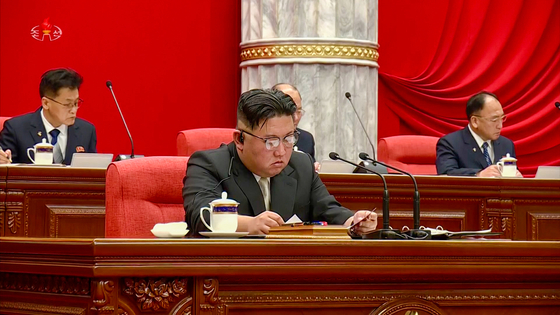North talks agriculture at big leadership meeting
![North Korea's leader Kim Jong-un is seen attending the 7th expanded plenary session of the 8th Central Committee of the ruling Workers' Party on Sunday in footage broadcast by Pyongyang's state-controlled Korean Central Televsion (KCTV) on Monday. [YONHAP]](https://koreajoongangdaily.joins.com/data/photo/2023/02/27/6149fcf9-3a48-4689-ac98-e4809077e2fe.jpg)
North Korea’s leader Kim Jong-un is seen attending the 7th expanded plenary session of the 8th Central Committee of the ruling Workers’ Party on Sunday in footage broadcast by Pyongyang’s state-controlled Korean Central Televsion (KCTV) on Monday. [YONHAP]
North Korea convened a meeting of its ruling party leadership, including leader Kim Jong-un, to discuss agricultural issues, state media said Monday amid external reports of serious food shortages inside the impoverished regime.
Kim presided over the 7th expanded plenary session of the 8th Central Committee of the ruling Workers’ Party on Sunday, according to state-controlled Korean Central News Agency (KCNA).
The key party session came after South Korean government officials and outside think tanks, such as the Stimson Center’s 38 North analysis group, reported that food insecurity in the North has reached a level not seen since the famine of 1990s, which Pyongyang’s state media refers to as the “Arduous March.”
Although food in the North is officially supplied to people through the regime’s public distribution system, the end of socialist bloc aid with the dissolution of the Soviet Union and communist regimes in eastern Europe in the early 1990s led to the collapse of the system, and food supply in North Korea is now heavily dependent on both unofficial and state-sanctioned markets that obtain rice and other agricultural products through trade.
The food situation in the North became precarious once again after Pyongyang closed its borders in response to the beginning of the Covid-19 pandemic in neighboring China — the North’s main trading partner — and international sanctions on its nuclear weapons and missile programs that have cut off the regime’s main sources of revenue.
The KCNA’s English-language report made little mention of the regime’s alleged food crisis in its report on the party meeting, saying only that participants will review achievements from 2022, the first year that the regime implemented new programs for a “rural revolution for the new era.”
The report also said the party meeting will decide “the immediate important tasks and the urgent tasks arising at the present stage of the national economic development and the practical ways for implementing them.”
Participants unanimously approved topics on the meeting agenda and discussed the first item, according to the KCNA. The state media outlet did not provide details about what the agenda items were, nor how long the meeting would continue.
Key party members who attended Sunday’s plenary session included Premier Kim Tok-hun and Jo Yong-won, the Workers’ Party secretary for organizational affairs. Other party officials also attended via video livestream, but the media outlet did not specify why.
Agriculture was previously mentioned as a priority issue at the 6th enlarged plenary session of the party’s central committee in December.
During that meeting, party leaders agreed that increasing grain production was the most important among 12 major economic tasks, state media reported.
North Korea also increased its budget for agricultural production by 14.7 percent at the most recent session of its rubber-stamp parliament held on Jan. 17 and 18.
The Rodong Sinmun newspaper — the ruling party’s main mouthpiece — published an editorial last week urging North Koreans to strive for “economic independence” and rejected foreign aid as “poisoned candy” designed to subjugate the regime’s independence.
The editorial acknowledged that “independent development” entails “overcoming countless challenges” in an implied acknowledgement of the regime’s economic difficulties.
An official from South Korea’s Unification Ministry told reporters recently that “North Korea’s food production has decreased, and changes to the food distribution policy by the authorities appear to have disrupted supplies.”
But the official did not clarify which areas of the North were particularly hard-hit by food shortages, saying only that the ministry was aware that deaths due to starvation had occurred in “certain regions.”
BY MICHAEL LEE [lee.junhyuk@joongang.co.kr]



















![[Column] ‘A victim of its own success’](https://dailyjoongang.ca/wp-content/uploads/2023/04/545252b5-4ec8-411e-b0da-e8e9d0e5a930-120x86.jpg)
